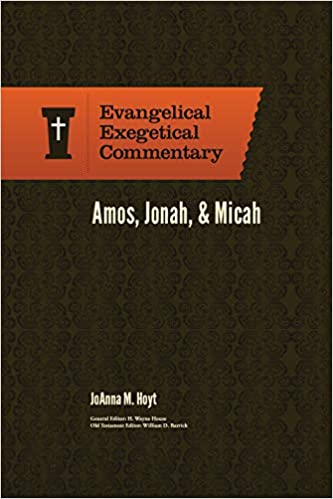JoAnna M. Hoyt. Amos, Jonah, & Micah. Evangelical Exegetical Commentary. Bellingham: Lexham Press, 2019. 880 pages. $54.99 (Hardcover).

With a commitment to robust exegetical analysis paired with solidly evangelical comments, the Evangelical Exegetical Commentary series has emerged as an excellent resource for students of the biblical text. The recent addition by Dr. JoAnna Hoyt, visiting professor at Dallas Theological Seminary, is a case in point. Coming in at over 800 pages, this volume is as comprehensive as it is practical.
The volume contains three separate commentaries on Amos, Jonah, and Micah. Each book receives a thorough introduction covering authorship, date, setting, audience, “intertextual issues,” theology, style, genres, unity, and structure. The introduction of Jonah is twice the length of the introductions for the other two books, engaging the issues of history and integrity at greater length. Each introduction surveys various proposals, both critical and conservative, for provenance and structure. A selected bibliography and bibliography of commentaries on the respective biblical book conclude each introduction.
The commentary portion for each book generally follows a parallel structure: introduction, outline of section, author’s translation, textual notes, verse-by-verse commentary with frequent “Additional Exegetical Comments” that discuss various issues, biblical-theological comments, application and devotional implication, and a selected bibliography for the unit. A general bibliography, including both technical publications and more general works, appears at the end of each commentary. Unlike other commentaries that synthesize large sections of material, this volume explores each verse independently, often at the clause level. This allows the author to consider textual and translation issues, as well as interpretive options, in depth. The individual verses are often set in conversation within the context of the larger Old Testament canon.
While one commentary cannot do everything, it would have been helpful to have further developed more whole-Bible, biblical-theological connections. For instance, the discussion of Amos 9:11–12 mentions the usage of these verses in Acts 15 (which is a major connection regarding Gentile inclusion), but only to discuss the text-critical issues. While there is a paragraph on the Acts passage in the “intertextual issues” sections in the introduction, it is absent from the biblical-theological comments that follow the exegesis. Readers who jump straight to Amos 9 in the commentary may miss the theological significance of the New Testament connection. Overall, however, the volume is an excellent addition to the study of these three prophetic books. The careful exegetical rigor shown by Dr. Hoyt is an excellent model for interpreters. The robust exegesis is matched by the expansive survey of the secondary literature. This allows readers to get an overview of different interpretations and viewpoints. Since the commentary works closely with the Hebrew text, readers with an introductory knowledge of Hebrew will find the volume most helpful. All readers will benefit from the biblical-theological and application sections, which aid in moving from exegesis to exaltation. For all these reasons, this volume will certainly join the list of my go-to recommendations for commentaries on Amos, Jonah, and Micah.
CBS book notices provide brief descriptive summaries and assessments of new publications in biblical studies and biblical theology. CBS book notices are not full academic book reviews. The present book notice was written by Dr. Andrew King, Assistant Dean of Spurgeon College and Assistant Professor of Biblical Studies at Midwestern Baptist Theological Seminary and Spurgeon College.



